What is Incoterms EXW? Everything you need to know
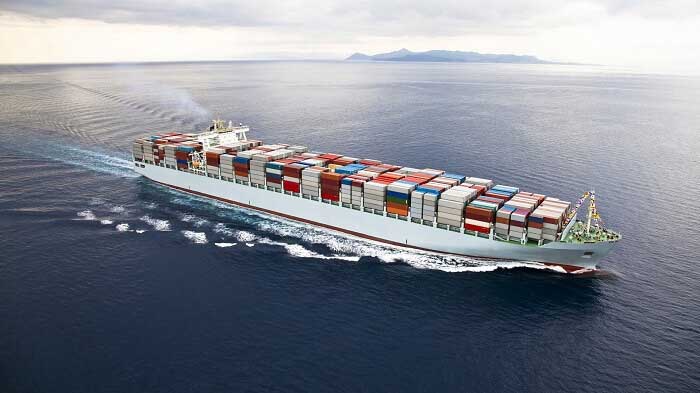
You’ll encounter various trade agreements between buyers and sellers, known as Incoterms. when shipping. One of these is the EXW (EX Works) incoterm
This easy-to-follow guide will break down what the EXW incoterm means. We’ll clarify the responsibilities of buyers and sellers, explain the point of risk transfer, and help you understand when EXW is a wise choice for your shipping needs. So, fasten your seatbelts as we begin this enlightening journey together!
What is Ex Works (EXW)?
EXW, or “Ex Works,” is a shipping arrangement where the Buyer is responsible for picking up goods from the seller’s premises and shipping them to the final destination. The seller’s responsibilities conclude when they make the goods available at their warehouse or any agreed location. From now on, you are responsible for arranging transportation, paying shipping costs, and managing customs clearance.
Usually, the seller’s obligations are minimal. They help you prepare the goods for pickup, package them, and provide the necessary documents for export clearance. Once the goods leave the seller’s location, their involvement ends, and you take over. This means you have complete control over your destination’s shipping process.
EXW can be used on all modes of transport, allowing buyers to have complete flexibility over their goods. However, EXW is only suitable if you’re an experienced buyer because it requires high planning and experience. If you’re a newcomer to shipping, it is better to partner with a freight forwarder to avoid mistakes and unexpected expenses.

What are the responsibilities of Buyers and Sellers in EXW?
Buyers and sellers have distinct responsibilities in an EXW (Ex Works) arrangement. As mentioned, the seller’s obligations are minimal, and the Buyer bears most of the liabilities.
Seller’s Responsibilities
● Preparing the goods and packaging them for pickup.
● Making the goods available for collection at their premises or any agreed location.
● Providing the Buyer with any necessary documentation for export, such as commercial invoices and packing lists.
Buyer’s Responsibilities
● Transporting the goods from the seller’s location to the port.
● Pay export duties and handle export customs clearance.
● Loading the goods on a shipping carrier and paying for all costs associated with the transportation and delivery of the goods, including freight and insurance.
● Handling import clearance and paying all required taxes.
● Unloading and moving your cargo to its final destination.
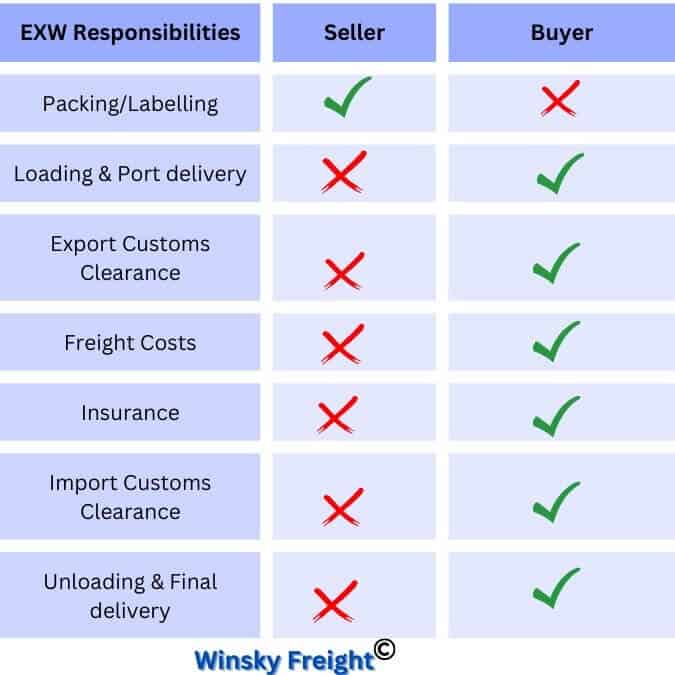
As you can see, EXW places a significant burden on the Buyer to manage the logistics and financial aspects of the transaction. At the same time, the seller’s responsibilities are limited to making the goods available.
When does risk transfer to the Buyer in the EXW agreement?
The risk associated with the goods shifts to the Buyer once the goods are made available by the seller. This location may be at the seller’s warehouse or any previously agreed-upon location. This means that the Buyer is responsible for any loss or damage to the goods from that point on. In terms of risk, this is a secure option for the seller and more stressful for the Buyer.
Advantages of EXW for the Buyer
It may seem like EXW only favors sellers because they bear no responsibilities, but buyers also have several benefits. Here are some of them:
● Control over the shipping process: Since you have more control over the shipping process, you can plan your logistics effectively according to your budget.
● Flexibility in Transportation: You can choose the shipping method and route best suits your needs and budget. You can also ensure your goods arrive faster and safely.
● Cost Savings: With careful planning, you can save on shipping and handling costs. Some suppliers are known to inflate shipping costs when handling buyer shipping. You can avoid being cheated by doing it yourself.
● Consolidating Shipments: If you’re a buyer who sources goods from different suppliers, EXW makes it possible to gather multiple shipments and ship them as one cargo.
● Faster Decision-Making: You can make quick decisions regarding transportation and logistics without waiting for the seller’s input or approval.
● Accessibility to quality markets: Many local sellers in China lack export licenses. Using EXW makes it easy to buy goods from such sellers.
● Hiding seller identity: EXW is an excellent option if you prefer to keep your seller’s identity a secret for a competitive edge.
Disadvantages of EXW for the Buyer
You should also be aware of the drawbacks of an EXW agreement. Here are some of them:
● Increased responsibility: With EXW, buyers bear more responsibilities, such as arranging transportation to the port, handling customs, and final shipping. This can be challenging if you lack experience exporting goods from that country.
● Increased risk: As soon as the goods are made available, the risk shifts entirely to the Buyer. Any damage or loss during transportation becomes your responsibility. If, for any reason, the goods can’t be exported, you’re alone in finding a solution to it.
● Complex customs clearance: Export customs clearance demands expertise. You might end up incurring fines or shipment delays due to errors.
● Limited seller assistance: Sellers have minimal obligations beyond making the goods available. This can result in missing documentation or a lack of guidance during transportation.
● Potential for overspending: Inexperienced buyers may underestimate transportation costs, which leads to expenses beyond their budget.
In summary, while EXW offers advantages like lower costs, it also places significant responsibilities and risks on the Buyer. Therefore, you should carefully consider the pros and cons of different incoterms before deciding.
If your supplier insists on using EXW terms, then you should use a freight forwarder Winsky can help you manage the export process from China or any other country. Contact us to get cheap and affordable shipping.
When should I use EXW?
EXW shipping can become a favorable option for you when:
- Your seller needs the necessary license or experience to export goods.
- You plan to combine shipments from various suppliers and export them as one cargo. This is usually done for convenience.
- You’re using Express shipping,, a door-to-door shipping mode. Express couriers pick up goods from the Buyer’s premises and deliver them to your doorstep.
- You have trusted freight forwarders like Winsky, who you want to handle the logistics process for you.
- You’re experienced in shipping goods from that specific country.
If you have made up your mind to use the EXW incoterm, discuss it with your seller so you’re both clear on the duties of both parties.
Best Alternatives to EXW
Here are some other incoterms for you to consider using apart from the EXW:
FCA- Free Carrier
In an FCA agreement, the seller delivers the goods to your chosen terminal or shipping carrier. The seller handles export customs clearance and the risk transfers to you when the goods are handed over to the page at the named place.
FCA provides more seller involvement in transportation and is a middle-ground option between EXW and other buyer-centric terms. It’s suitable when you want some control over the shipping process but need the seller’s assistance with export clearance.
FOB- Free on Board
FOB is a very popular incoterm. It is similar to the FCA but is specifically used for ocean shipping. In this incoterm, the seller delivers the goods to the agreed port, clears them for export, and loads them onto the shipping vessel.
You only begin to bear the risk when the goods board the vessel. FOB is less stressful than EXW because the seller handles your export clearance.
CIF (Cost, Insurance, and Freight)
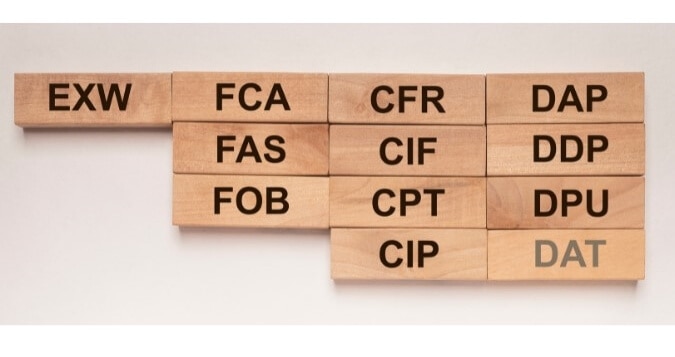
In CIF, the seller is responsible for shipping the goods to your destination port. The seller covers all logistics, insurance, and export customs clearance and is liable for losses or damages during transit. The risk transfers to you when the goods arrive at the destination port.
You’re responsible for import clearance and transporting the goods from the port to your doorstep. The CIF incoterm is a favorable choice when you want added protection for your goods during transit because it covers insurance.
These alternatives offer different degrees of seller and Buyer involvement and risk transfer. Your choice among them should depend on your specific shipping needs.
Tips for Using EXW Effectively
Note the following practical tips when using an EXW agreement with your seller:
● Clearly state the pickup location in the contract agreement.
● Request all necessary documents from the seller.
● Ensure you specify how the goods should be packaged and labeled for safe shipping.
● Request for a freight forwarder if you’re new to shipping.
● Confirm that your freight forwarder has the requirements and license to export to the destination country. If you work with a trustworthy freight forwarder like Winsky Freight, this is not a problem.
FAQs
What is EXW shipping?
EXW, or “Ex Works,” is a shipping arrangement where the Buyer is responsible for picking up goods from the seller’s premises and shipping them to the final destination. The maximum responsibility for cargo rests on the Buyer, and the seller’s involvement is minimal.
What costs are you responsible for in EXW?
In an EXW agreement, you are responsible for transporting freight costs and customs duties from the seller’s premises to the port.
Is EXW or FOB shipping cheaper?
EXW goods are generally cheaper because the seller charges you only for the costs. However, logistics costs may eventually raise the price of EXW shipping to be higher than FOB, especially if you need to gain experience negotiating freight costs.
What is the difference between FCA and EXW?
FCA (Free Carrier) and EXW are similar in that both involve the seller making goods available at a specific location. However, in FCA, the seller is responsible for transportation and export customs clearance. While in EXW, the Buyer bears full responsibility for these.
Who handles customs clearance in EXW shipping?
You are responsible for handling import and export customs clearance in an EXW agreement. This entails getting all the necessary documentation and paying customs duties.
Who pays freight costs on Ex-Works?
The Buyer is responsible for paying freight and other shipping costs in Ex-Works. The total freight costs vary depending on the mode of shipping chosen.
Conclusion
EXW gives you complete control of the shipping process but also comes with many responsibilities. Before you decide, weigh the pros and cons of this incoterm carefully.
In this article, we have explained the EXW shipping incoterm so you can clearly understand the responsibilities involved.
If you still need to decide which incoterm is right for you, no problem! Just drop us a message below, and we’ll gladly guide you.
Remember, the best way to use an EXW incoterm is to partner with a reputable freight forwarder. Our experienced team will assist you in transporting your goods to the port and shipping them to the destination country. Get in touch with us today!
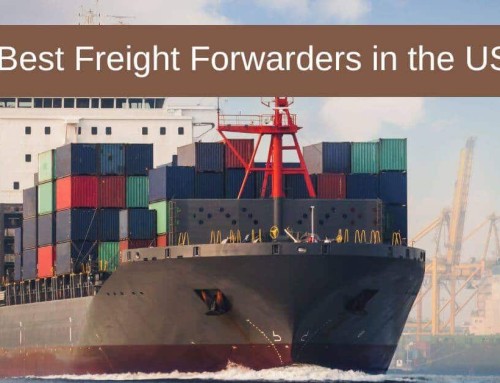
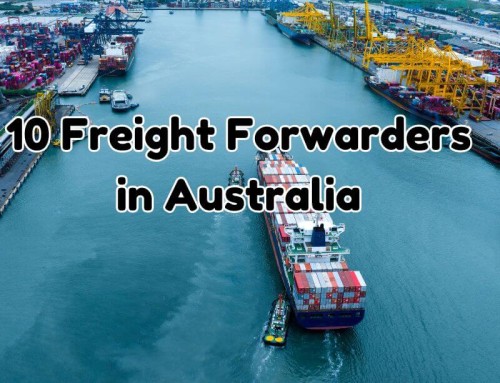
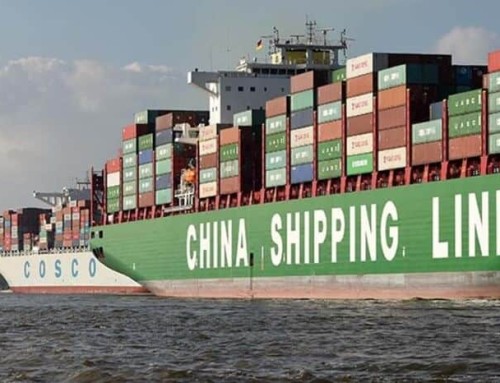
Leave A Comment